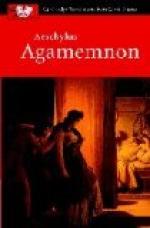P. 21, l. 487.]—This break in the action, covering a space of several days, was first pointed out by Dr. Walter Headlam. Incidentally it removes the gravest of the difficulties raised by Dr. Verrall in his famous essay upon the plot of the Agamemnon.
P. 21, l. 495, Dry dust, own brother to the mire of war.]—i.e. “I can see by the state of his clothes, caked with dry dust which was once the mire of battle, that he comes straight from the war and can speak with knowledge.” The Herald is probably (though perhaps not quite consistently) conceived as having rushed post-haste with his news.
Pp. 22 ff., HERALD.]—The Herald bursts in overcome with excitement and delight, full of love for his home and everything he sees. A marked contrast to Agamemnon, ll. 810 ff. Note that his first speech confirms all the worst fears suggested by Clytemnestra. Agamemnon has committed all the sins she prayed against, and more. The terrible lines 527 ff., “Till her Gods’ Houses, etc.,” are very like a passage in the Persae, 811 ff., where exactly the same acts by the Persian invaders of Greece make their future punishment inevitable.
P. 22, l. 509, Pythian Lord.]—Apollo is often a sinister figure in tragedy. Cf. Sophocles Oedipus , ll. 915 ff., pp. 52 ff., and the similar scene, Electra, 655 ff. Here it is a shock to the Herald to come suddenly on the god who was the chief enemy of the Greeks at Troy. One feels Apollo an evil presence also in the Cassandra scene, 11. 1071 ff., pp. 47 ff.
P. 23, l. 530, Happy among men.]—The crown of his triumph! Early Greek thought was always asking the question, What is human happiness? To the Herald Agamemnon has achieved happiness if any one ever did. Cf. the well-known story of Croesus asking Solon who was the happiest man in the world (Herodotus, I. 30-33).
P. 24, ll. 551 ff., Herald’s second speech.]—The connexion of thought is: “After all, why should either of us wish to die? All has ended well.” This vivid description of the actualities of war can be better appreciated now than it could in 1913.
P. 25, l. 577, These spoils.]—Spoils purporting to come from the Trojan War were extant in Greek temples in Aeschylus’ day and later.
P. 26, l. 595, Our women’s joy-cry.]—There seems to have been in Argos an old popular festival, celebrating with joy or mockery the supposed death of a man and a woman. Homer (Od. iii. 309 f.) derives it from a rejoicing by Orestes over Aigisthos and Clytemnestra; cf. below, ll. 1316 ff., p. 59; Aeschylus here and Sophocles in the Electra, from a celebration by Clytemnestra of the deaths of Agamemnon and Cassandra. Probably it was really some ordinary New Year and Old Year celebration to which the poets give a tragic touch. It seems to have had a woman’s “Ololugmos” in it, perhaps uttered by men. See Kaibel’s note, Soph. Electra 277-281.




